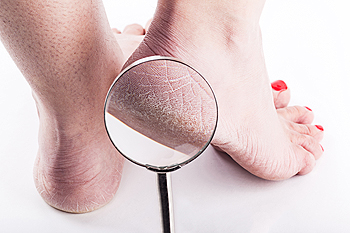 If you have ever experienced a foot condition that is known as cracked heels, you may be aware of the pain and discomfort that is often associated with it. The skin on the heels often becomes dry and hardened, and this typically indicates that the condition is beginning to develop. There may be several causes for this to occur, including a predisposition to skin conditions, which may include psoriasis or eczema, or other medical maladies such as diabetes or thyroid concerns. If the patient is diabetic, the cracks or fissures may not be felt, which may be due to a condition that is referred to as diabetic neuropathy. This may cause a lack of sensation and any pain and discomfort that is present may not be noticed. If you feel you are developing cracked heels, it’s important to confer with a podiatrist who can advise you on how to properly treat this condition, which may be helpful in attaining maximum comfort.
If you have ever experienced a foot condition that is known as cracked heels, you may be aware of the pain and discomfort that is often associated with it. The skin on the heels often becomes dry and hardened, and this typically indicates that the condition is beginning to develop. There may be several causes for this to occur, including a predisposition to skin conditions, which may include psoriasis or eczema, or other medical maladies such as diabetes or thyroid concerns. If the patient is diabetic, the cracks or fissures may not be felt, which may be due to a condition that is referred to as diabetic neuropathy. This may cause a lack of sensation and any pain and discomfort that is present may not be noticed. If you feel you are developing cracked heels, it’s important to confer with a podiatrist who can advise you on how to properly treat this condition, which may be helpful in attaining maximum comfort.
Cracked heels are unsightly and can cause further damage to your shoes and feet. If you have any concerns, contact Dr. Steven Sheridan from Ankle & Foot Specialty Clinics. Our doctor can provide the care you need to keep you pain-free and on your feet.
Cracked Heels
Cracked heels appear unappealing and can make it harder for you walk around in sandals. Aside from looking unpleasant, cracked heels can also tear stockings, socks, and wear out your shoes. There are several methods to help restore a cracked heel and prevent further damage.
How Do You Get Them?
Dry skin is the number one culprit in creating cracked heels. Many athletes, walkers, joggers, and even swimmers suffer from cracked heels. Age and skin oil production play a role to getting cracked heels as well.
Promote Healing
Over the counter medicines can help, especially for those that need instant relief or who suffer from chronic dry feet.
Wear Socks – Wearing socks with medicated creams helps lock in moisture.
Moisturizers – Applying both day and night will help alleviate dryness which causes cracking.
Pumice Stones – These exfoliate and remove dead skin, which allows for smoother moisturizer application and better absorption into the skin.
Change in Diet
Eating healthy with a well-balanced diet will give the skin a fresh and radiant look. Your body responds to the kinds of food you ingest. Omega-3 fatty acids and zinc supplements can also revitalize skin tissue.
Most importantly, seek professional help if unsure how to proceed in treating cracked heels. A podiatrist will help you with any questions or information needed.
If you have any questions, please feel free to contact our office located in Sandusky, MI . We offer the newest diagnostic and treatment technologies for all your foot care needs.
